Siberian Huskies are beautiful dogs. They look like wolves, and have thick, soft coats, that make them infinitely cuddly. They have piercing eyes, and wonderful masks, that give them a roguish and unique look.
Siberians can make very good family pets. If properly trained, they can be very good with people, children, and other dogs. Indeed, Sibes are commonly known for their friendliness toward people.

Although they may look like fierce wolves, they have the heart of Casanova. All my Huskies want to do, is greet everyone and give them licks.
However, many people have trouble with this breed, and many Sibes get surrendered every year.
Consider these Siberian Husky facts, before going out and getting a puppy. The Siberian Husky is a very special and lovable breed, but they may not be the right breed for everyone.
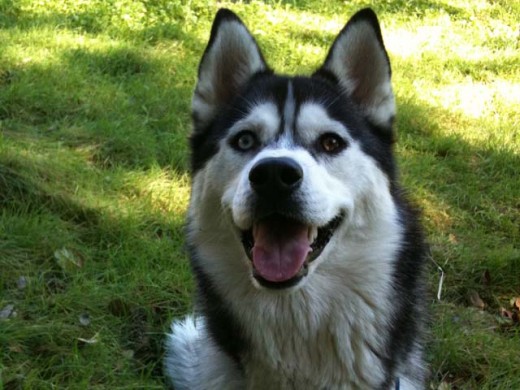
1. Siberian Huskies Shed a Lot!
Be ready to have dog hair all over the house – floors, carpets, clothing, furniture, everywhere.
If we are allergic to dog hair, or like our home to be very clean, then the Siberian Husky is not for us.
When I was looking for a Sibe, I talked to a few breeders in my area. The first thing they all said was, “Siberians shed a lot”. I mentioned that my other dog, a Shiba Inu, also has a double coat, and also sheds a fair amount. However, they all said, “Siberians shed a lot more”.


And they do! A whole lot more.
Therefore, it is very important to train our Husky puppy to enjoy the grooming experience.
- I start with a soft brush, and lightly comb my dog’s body for a short period of time.
- I do this often, and pair it with food rewards.
- Once my puppy is comfortable with the brushing process, I very slowly extend the length of our grooming session.
- Finally, I repeat the process with a more solid brush, such as the Furminator.
Frequent brushing is a good idea to keep our Husky clean, and clear out loose hair. The more hair on the Furminator, the less hair on the floor.
About twice a year, my Sibes blow their coat. During this time, there will be more fur than ever. To keep things under control, I try to brush every day. Remember to always keep brushing sessions fun, rewarding, and not overly long.
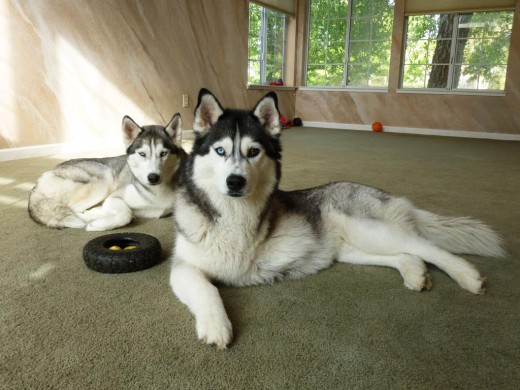
2. Siberian Huskies Make Awful Watch Dogs
Because Huskies look like wolves, many people assume that they are fierce dogs. Some people may even think that they are wolf hybrids.
However, a Sibe is more of a lover and less of a fighter.
When confronted with a stranger, my Husky will usually run up to him, give licks, and beg for food. As a result, Sibes do not make very good watch dogs. They will not only welcome everyone into your house, but will also give them the royal lick treatment.
If we want a dog that is only loyal to us and our family, then the Siberian Husky is not for us.
My Huskies are naturally happy and trusting dogs, who like to be with everyone. That is one of the things that I love most about them.
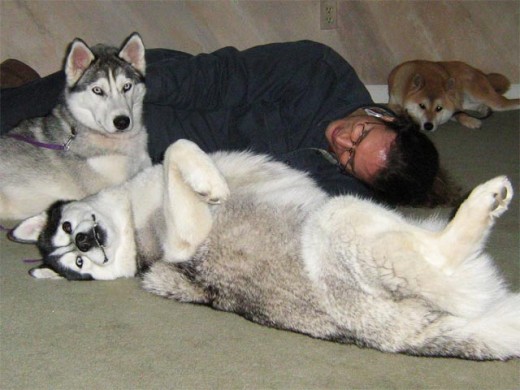
The Siberian Husky is not a watch dog, although those ignorant of his true nature may be frightened by his appearance. If you want a dog with aggressive guard-dog instincts . . . don’t buy a Siberian.
~~[SHCA]Leave your home in the care of a “guard” Siberian and he will most likely welcome an intruder with open arms, fetch (for the first time in his life) your valuables and show him the best route of escape–after all, Siberians are great escape artists.
~~[Siberian Rescue Site]
Note – This does not mean that Huskies will never be aggressive toward people. A dog’s behavior is determined both by genetics (breeding), as well as by training, socialization, context, and past experiences. A dog may become aggressive as a result of improper training, bad social experiences, insufficient socialization, and more.
For reasons of safety, it is important to ensure that our companion dogs are not people aggressive. Most companion dogs today guard us, by sounding an alert when unknown or strange people come close to our house. These dogs are not people aggressive. They do not bark, lunge, or growl at passers-by during walks. They are not aggressive toward guests and unknown visitors, who may need to work in or around our house. Their job is simply to alert us, when unusual events occur close to home. Anything more would quickly become dangerous and risky.
Highly trained guard dogs, such as those employed by law-enforcement, may be trained to attack or restrain an intruder. However, they are always under the control of their handler, are extremely well managed, and will only attack on-command or when they think their handler is in clear danger (as defined during training). They also do not bark or growl at pedestrians.
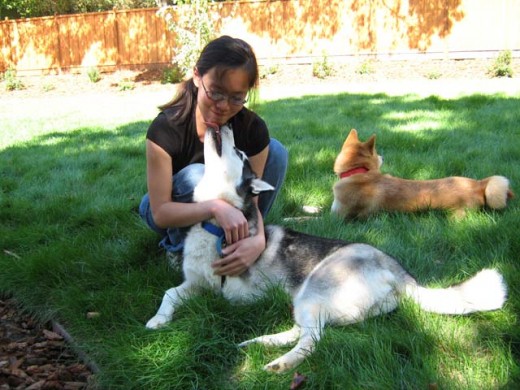
3. Siberian Huskies Have High Energy
They are intelligent, athletic, and were bred to pull sleds for extremely long distances, in the freezing cold. Therefore, be prepared to provide a Husky with a lot of mental and physical exercise.
A young Husky needs activity almost all day round. At around one-year old, my Sibe puppy sleeps for perhaps 3-4 hours during the day, and about 10 hours during the night. That leaves about 10 hours during the day where she is on the go.
She drains her energy most by playing with my other dog, a Shiba Inu. However, even my Shiba cannot fully keep up with her.


In addition to the playing, she works for all of her food, has long walks in the park several times a week, has structured dog play sessions, dog obedience training sessions, and still has energy left over to explore and dig in our backyard.
If bored, a Husky can become unhappy. He will likely escape, or use our house and belongings as chew toys. Unless our backyard is extremely secure, he can easily jump over or dig under a fence, in order to find adventure elsewhere.
If we are away at work for most of the day, then the Siberian Husky is probably not for us.
Siberians like having company and activity all day long. It is possible that a Husky can keep himself occupied if we have other dogs, but he may also lead our entire pack into mischief!
Sibes do best when there is frequent human supervision, throughout the day.
Siberians are a gregarious lot and need the company of other dogs or of people at all times.
~~[SHCA]The Husky needs lots of exercise and entertainment. They love to run and play, but must be allowed to do so safely.
~~[Hillside SPCA]

4. Siberian Huskies Are Independent Thinkers
They have a very independent mind and spirit, and will only perform, if we make it worth their while.
If we want an obedient dog that only lives to please us, then the Siberian Husky is not for us.
A Sibe is not a “yes sir, no sir“, kind of dog. To live well with him, we need to be fair, but firm. We need to consistently enforce our house rules, or he will take over the house.
The best way to train a Husky, is through the control of resources. Teach him that the best way to get what he wants, is to first do what we want. I use reward obedience training, and follow the Nothing in Life is Free program. Harsher techniques can make a Siberian distrustful, and ruin the natural free spirit of the breed.
Huskies are independent hunters. Their original breeders, the Chukchi of Northeastern Asia, would let their dogs free during the summer months to hunt for food on their own.
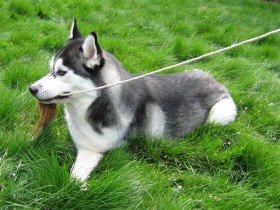
This has two very important consequences for living with a Husky today –
- A Siberian is not to be trusted with cats or other small animals. He can be trained to live with cats, but his instinct is to hunt them;
- A Siberian is not to be trusted off-leash. If he sees a small animal, he will likely bolt after it, and forget about cars, commands, and everything else. By the time he comes to his senses, he may be lost and far from home.
I have gotten a few comments about cats lately, so let me be clear …
Sibes can be trained to live with household cats. However, they usually have high prey drive, and will likely want to hunt and chase small animals, including squirrels, mice, and cats. Just because a Siberian gets along with our house cats, does not mean he will treat other neighborhood cats in the same way.
Huskies are bred to run and pull. This makes them more difficult to leash train than many other breeds. To train a Husky to walk on a leash, we need to have an immense amount of patience. Always be firm and consistent with the no-pulling rule, and reward good behavior.
If we do not have a large backyard, bring our Sibe to an enclosed park or soccer field, so that he can have some nice off-leash time to run, run, run.
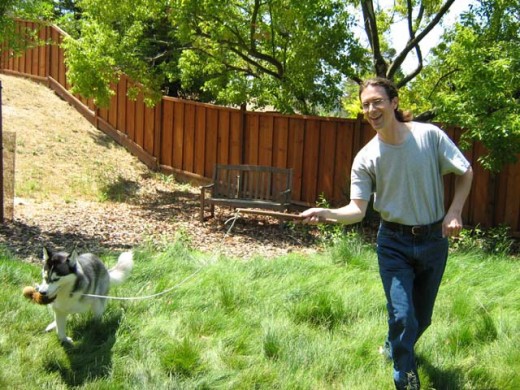
5. Siberian Huskies Are Not the Easiest Dogs to Potty Train
Certain dogs, like the Shiba Inu, are naturally clean and absolutely do not like soiling their living space. Because of their natural cleanliness, they are extremely easy to house train.
Sibes do not have that natural sense of cleanliness. In fact, they do not mind playing, and running around in their own waste products. Therefore, we must make it worth their while to potty outside.
Supervise our Husky puppy at all times, until he is fully house trained. Reward him well for pottying outside with high priority dog treats, play, and praise. If we are consistent with our puppy potty training, he will learn quickly, and be happy to go outside after a few weeks.
In addition, as Gigi points out, potty training difficulty is very dependent on what the dog or puppy is used to, in his previous environment. Puppy mill and pet store puppies are caged, most of the time. As a result, they will be harder to house train, because they are accustomed to going in their crates.

Where to Get a Siberian Husky Puppy
If we still want a Husky, then visit the Siberian Husky Club of America for a breeder list. Also consider adopting one from a local Husky rescue.
It really makes a BIG difference to get a puppy from an accredited breeder.
Please do not buy a puppy from online puppy sites or pet stores. Most of their puppies come from backyard breeders or puppy mills. Buying from them, will only help support and continue the dog cruelty of these unscrupulous puppy breeders.
If we are concerned about the initial cost of a puppy, consider that backyard breeders and puppy mills frequently produce unhealthy and unbalanced puppies. They will end up costing us a lot more, in terms of vet bills, dog training bills, and property destruction.
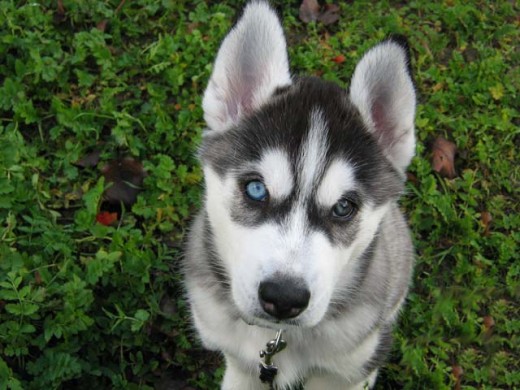
Siberian Huskies Are Wonderful Dogs

I love my Sibes. However, just because I think Huskies are wonderful dogs, does not mean that everyone else will think so as well; nor does it mean that they will fit into someone else’s lifestyle.
Clearly, each dog is an individual and will differ in terms of prey drive, energy level, obedience, and more. However, general breed characteristics and information from reputable sources, will give us a better idea of what to expect.
Often, there is conflicting information on the web. Therefore, one good place to start is with the AKC-recognized national breed club – The Siberian Husky Club of America.
Captivating in their beauty, grace and childlike demeanor, Siberians catch the eye of adults and children alike. They can be wonderful dogs for the well-informed or experienced Husky owner. However, they are NOT the breed for everyone and definitely not for first time dog owners. Too many wind up lost, in shelters, killed on the highway, abandoned or abused because the owner didn’t understand the breed and it’s challenging traits.
~~[Hillside SPCA]
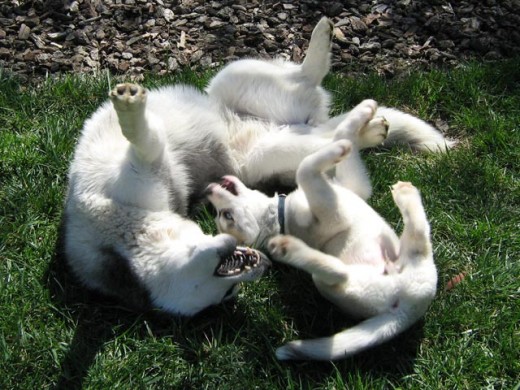
Hello my name is Jorge and I live in Dallas Tx. Im looking into getting a Siberian Husky thats 5 months old from a couple in Duncanville Tx. Well im 22 yrs old and have a home, of course with my parents. We have 2 chihuahuas with us and a pretty nice yard to run around and play. I work the graveyard shift and love to walk the White Rock Lake which im close to. Theres also Lake Ray Hubbard which im not too far off which allows for swimming. Texas usually at this time gets hot. Well I fell in love with the husky and have been searching for one. Im a pretty patient person and would love a companion of my own. What do you think? Please respond.
Hello Jorge,
Your young and active lifestyle sounds like it would fit well with a Siberian Husky.
Few things to consider-
1. Many Siberian Huskies have high prey drive. They will need to be supervised closely and carefully managed while interacting with small dogs, as well as trained on what are acceptable and not acceptable play behaviors. A Husky is going to be a lot bigger than a Chi, so even accidentally stepping on them, rough-play, or an accidental bump could cause harm. Also a small dog may be fearful of a large dog, and start showing fear aggression.
Have you met the Husky you are planning to adopt? Has he been socialized with other dogs? How does he react to small dogs? How do your Chis react to large dogs? I usually like to meet a dog a few times, take him out on some test walks, gauge his energy level and personality, so that I can tell if he will be a good fit.
2. Is the Husky going to be an inside dog or outside dog? My Huskies do not do well in hot weather, so during the summer they prefer to stay inside the house, with the AC or fans on. Swimming in the lake sounds like a lot of fun, but some dogs may not enjoy swimming. I would ask the couple about their Husky, his routine, favorite activities, and whether he likes being in water.
3. Is the Husky potty trained? Potty training requires a lot of close supervision, so that may involve some extra time with the dog in the beginning.
4. Consistency is very important in training my Huskies. What works well with my dogs, is for everyone in our house to pitch in and help with training, so that there is continuity, consistency, and trust with the whole family.
Hope this helps. Good luck and let us know how it goes!
I’m a 60-year-old man who lives alone and last lived with a dog when I was 12. I saw a beautiful 2-year-old Siberian Husky at the county animal shelter. I didn’t adopt him, but can’t get him out of my mind.
I haven’t adopted him because of my age and what I perceive to be his need for hours a day of activity/energy expenditure that I may not be able fulfill. I’m willing to walk him at least a couple of times a day. (I currently walk alone for a mile, twice a day.) And, would like to take him to a local dog park, though I’m aware that caution is warranted if small dogs, such as chihuahuas, are present. I live in a small house with a small non-grass, fenced-in back yard.
Please tell me what you think about me having a Sibe. Thank you.
Hello Bruce,
I think the 2 walks, as well as frequent human companionship and supervision during the day sounds great.
Did you interact with him while you were there? What was his energy level like? Most places will also let you take the dog out on some test walks around the area. I usually like to visit a dog a few times, take him out, and see how things go, to help me make a good decision.
Unless they have been leash trained previously, Sibes may like to pull, so that would be something to look out for.
Do you know what his background is? And whether he has had prior training?
If you are not sure about adopting, I would also consider contacting a local Husky rescue to see if they are interested in fostering him. Most city shelters are over-crowded, and have limited space. It would be a shame for a dog like that not to have a second chance.
Please keep us updated and let us know if you have more questions.
I have a 8 month old sibe puppy. He is the greatest dog ever. But when my boyfriend is over it seems like he has accidents all the time inside the house even after I take him out. But when it’s just me he never has any accidents. Do you know if thats a jealousy thing? And secondly, my puppy gets soooo excited and obnoxious when he sees new people. Hes gone to puppy training classes and it didn’t really help with that problem. He tries to jump on them runs around like crazy and barks like no other. Is that normal for this breed? And my last question is, when I start to play with him I sometimes get a little worried because his shoulder hair stands up and he starts barking and acting like hes going to bite me but never actually does even if my hands right by his mouth. I know huskies play rough but is he taking it a little too far? I did my research before getting him but these were problems that were never brought up.
It could be excitement or submissive urination.
http://www.humanesociety.org/animals/dogs/tips/excitement_urination.html
http://behavior.vetmed.ucdavis.edu/local-assets/pdfs/Submissive_and_Excitement_Urination_in_Dogs.pdf
In terms of jumping on people, this is what I do to train my Huskies-
http://shibashake.com/dog/stop-your-dog-from-jumping-on-people
In terms of play, I make sure to set up clear play-rules and I teach my Huskies what their play boundaries are. For example, there is no jumping on me, no biting on me, and no rough stuff with people. If they do something they are not supposed to, I no-mark, stop the game temporarily, and ask them for a simple pre-trained command (e.g. Sit). I reward them for following the command, get them to calm down, and then restart the game *after* they are calm. In this way, they learn that –
Jumping and biting on people = Game stops,
No jumping and biting = Play continues.
I also manage their excitement level during play by throwing in many play-breaks.
My Husky Lara’s shoulder hair also stands up during play. With her, it is due to excitement. I just throw in a play break if I think she is getting too excited.
I also set up a fixed routine, consistent rules, and follow the Nothing in Life is Free program with my dogs.
Hope this helps. Big hugs to your Husky puppy!
I will be getting Husky Soon but i don’t know if they get furious and they will get angry and attack i am wondering because me cousins come alot and one of the are scared of dogs that bite
Manuela
I would consider carefully before getting a Siberian Husky. They are a *very* energetic and independent minded breed. Husky puppies are big time Energizer Bunnies. 😀
I walk my Huskies daily for about 1.5-3 hours. We also do training exercises, grooming exercises, and structured games. If we do not provide a Husky with enough structured activities, he will find activities to do on his own, which may include digging up our backyard, digging under the fence and escaping, chewing up our shoes, and more.
Initially, a dog will not know how to interact with people and what our human rules are. Therefore, it is up to us to teach them our rules, teach them to control the force of their bites, teach them how to properly greet people, and more. Independent minded dogs, like the Siberian Husky, will require more structure and more resource based training.
My Huskies are a big time commitment, especially during the first few years, because they have a lot of energy and need a lot of structured exercise.
Here is a bit more on how I trained my Husky puppy.
Hi i’m Dana,
I know its a girls name but i’m a guy. So i was planning to get a husky puppy soon. I want to keep him outside so i’ll have like a big cage for him since our fence isn’t that high. I’d take him out for walks everyday and even if i’m not home my little sister (9years old) and my mum will be home. So is there anything special i need to know? By the way this will be my first dog i never had one.
Thank you 🙂
P.S i love this site!
Congratulations on your upcoming Husky puppy!
The thing that really struck me with my first Husky is that she is very energetic, especially as a puppy. She wanted to be doing things pretty much all of the time. I had to supervise her a lot in the beginning, and also do potty training exercises. Puppies still have developing bladders and need to pee very often, so I only kept her for a *very short* period of time in her crate. I also did crate training exercises so that she would not get anxious and cry when confined.
More on how I potty trained my Husky puppy.
She also really likes being with people. I spent a lot of time playing with her, training her, and getting her used to grooming. If I didn’t redirect her energy into positive activities, she would find her own activities that will not be very furniture or people friendly. 😀 If they don’t get enough activity, they will get stressed, anxious, unhappy, and try to escape.
Huskies (especially a young Husky) may howl when separated from their family, when frustrated, over-excited, and more. This can make neighbors very unhappy.
More on training techniques I used with my Husky puppy.
My Huskies prefer to stay inside the house with me most of the time, especially when it is hot outside. I can keep them engaged inside the house, and I can supervise them when they play. I let them out in the backyard whenever they want to do their business, smell the wind, or just hang-out. However, because they have thick fur, they heat up very quickly and don’t cope well with high temperatures.
When it is hot, it gets uncomfortable for them outside, so they usually want to come back in right away. I make sure they have a lot of clean water, shade, and free air-flow outside and inside. Note that enclosed spaces such as kennels, crates, and cars, may provide shade but they also trap hot-air in a small space, and that can cause heatstroke in dogs.
More on how I keep my Huskies cool during the summer.
Good luck and post us some pictures of your puppy when you can!
Hi there !
My name is connor , currently 16 years of age (nearly 17) and I’m in my second to last year at High school . I’m extremely physical and active and go to the gym on an everyday basis early morning. I have always wanted a husky and would love to have a husky boy with me for years to come . I am at school between the hours of 8.50am and 3pm . Is it ok to have a husky at home during the day while I am at school . As stated I am physical and would take the dogs for long walks and play every morning and possible twice a night ? Please help haha I really want one
Thanks
Connor
Yeah, I know what you mean. I have always wanted a Sibe too when I was growing up.
Some things that I considered –
1. Will I be going to college after high school? Would I take my dog to college? College can be a very busy time, with a very variable schedule. This makes it more difficult to have a dog.
2. Will there be anyone home with the dog when I am away during school?
3. Where will I put my Husky during that time and how will I keep him occupied?
In the end, I decided not to get a Husky until after college. Not saying that it is not possible, but there are many related questions to consider. Also, I wanted to train and bring up my Husky in my own way, without any family/parental constraints.
Hi, I am 13 years old and looking to get another dog. I currently have a male 7 pound 2 year old mini fox pinscher (mini pin/ mini fox terrier mix) named kolache. I really want a husky but I’m afraid that it could hurt kolache. The dog that I really want is a husky and gsd mix. Here’s the link to his listing http://www.petfinder.com/petdetail/26484509 do You think that the gsd part of the dog could alter it’s prey drive?
What a handsome dog!
The first thing I would do is contact the rescue agency (together with your parents) and then get in touch with Bandit’s current foster parents. They will probably be able to give you some information about Bandit’s temperament and how he would be with small dogs.
The thing is, all dogs have prey drive. Some dogs have more of it than others. With proper training and management, we can teach our dog to tolerate and get along with other dogs, and also with house cats. Dogs with higher prey drive, however, will usually require more training and management. Also, a large dog may inadvertently hurt a smaller dog during play, because of the size difference.
Here is an article on GSDs and small dogs.
My Husky is almost 2, female, and still hasn’t started her menstrual cycle. I got her as a 6 week old unaltered pup, and definitely haven’t had her altered. When is this going to start already?! LOL Thanks
I believe the timing is variable across individual dogs. Here are a couple of threads on a Husky’s first heat cycle-
http://www.itsahuskything.com/t6480-first-heat
http://www.dogster.com/forums/Siberian_husky/thread/576771
Hello!!
I wanted to get a Siberian Husky, but I’m worried about getting one at the same time. I have a bird and 2 Guinea Pigs and I’m worried that her hunting instincts will be to attack or hunt them.
I’m also at school for 7 hours out of a day, so I’m not sure if I’d be there to take care of her.
What should I do??
Yeah, dogs require a lot of time, attention, and exercise, especially energetic dogs like the Siberian Husky. I waited until after I finished school and had more time before I got my dogs. I am glad I did, because I had a very difficult time with Sephy, and it would not have been possible for me to properly retrain him if I had a tight schedule.
Here is a story of my childhood dog.
Hello,
I have a 6 month husky. I’m having trouble with her jealousy with my other dog. They play all the time and get along well. They also are very well trained but whenever I give my Pomeranian attention, my husky comes crying and snapping at me for attention. Is there anything I could possibly do.
Yeah, my Huskies get jealous too but I make sure to teach them that they *only* get affection by giving me good behavior.
Usually, when I start giving affection to one of them, the other one will come over. When she does, I tell her what to do, e.g. Down (which I have trained previously). As soon as she does this, I mark the behavior (Good), and then give her affection as well.
If either of them shows any anti-social behavior (e.g. whining, pushing the other one away), then I no-mark the behavior, and tell her what to do (Down). If she does not go down and stay calm, then I withdraw my attention and ignore her. If she tries to push away or bite the other dog, then I no-mark and body block her away. If she keeps coming back, then I calmly say Timeout and remove her into a timeout area.
In general, I start by teaching my Husky what to do, so that I can reward her for doing the right thing. Then, if she misbehaves, I give her many chances to do the right thing. If she does the right thing, then she gets rewarded with attention and affection. However, if she continues with her bad behavior, then she loses my attention, and may ultimately lose her freedom (temporarily). In this way, she learns –
Down and calm = Get attention and tummy rubs,
Whining and biting = No attention and may temporarily lose freedom in the house.